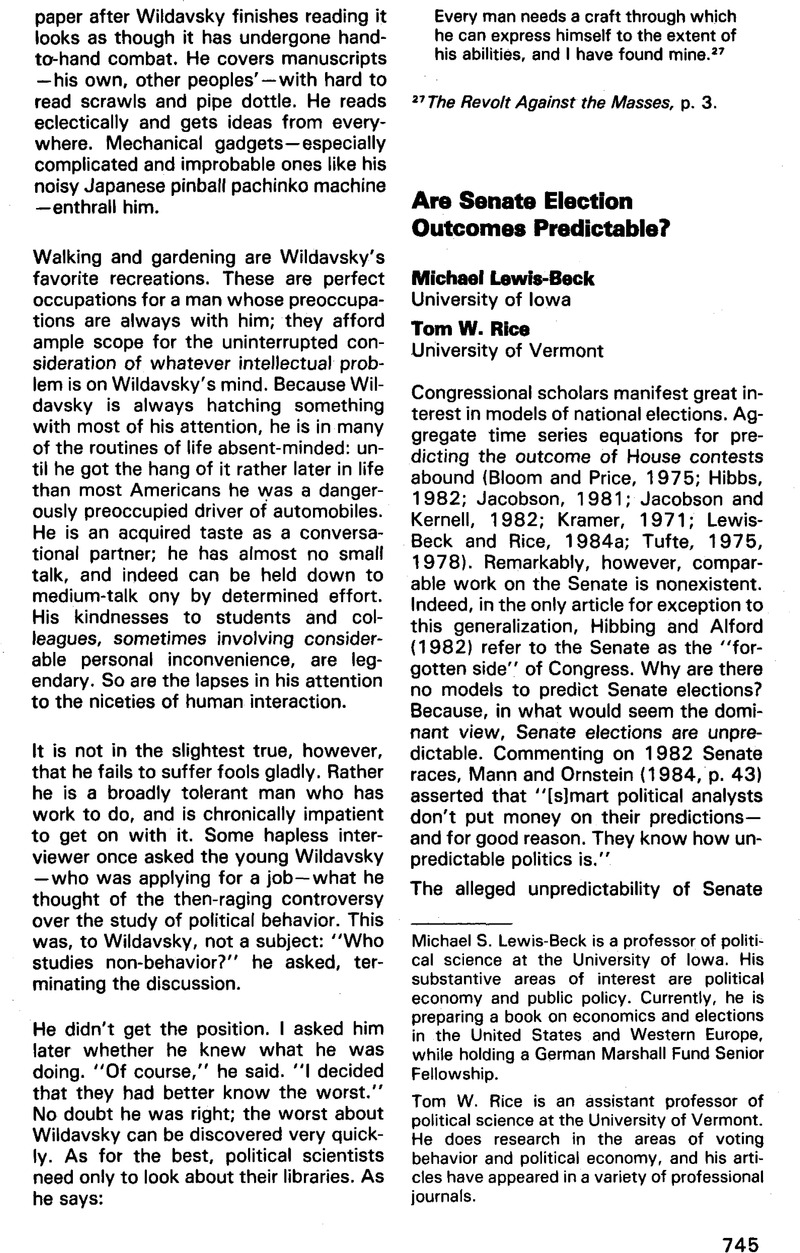Crossref Citations
This article has been cited by the following publications. This list is generated based on data provided by Crossref.
Lipset, Seymour Martin
1986.
Beyond 1984: The Anomalies of American Politics.
PS,
Vol. 19,
Issue. 2,
p.
222.
Lipset, Seymour Martin
1986.
Beyond 1984: The Anomalies of American Politics.
PS,
Vol. 19,
Issue. 2,
p.
222.
Lipset, Seymour Martin
1986.
Beyond 1984: The Anomalies of American Politics.
PS: Political Science & Politics,
Vol. 19,
Issue. 02,
p.
222.
Claggett, William
1986.
A Reexamination of the Asymmetry Hypothesis: Economic Expansions, Contractions and Congressional Elections.
Western Political Quarterly,
Vol. 39,
Issue. 4,
p.
623.
Holbrook-Provow, Thomas M.
1987.
National Factors in Gubernatorial Elections.
American Politics Quarterly,
Vol. 15,
Issue. 4,
p.
471.
Campbell, James E.
1987.
Evaluating the 1986 Congressional Election Forecasts.
PS,
Vol. 20,
Issue. 1,
p.
37.
Campbell, James E.
1987.
Evaluating the 1986 Congressional Election Forecasts.
PS,
Vol. 20,
Issue. 1,
p.
37.
Lewis-Beck, Michael S.
and
Rice, Tom W.
1988.
Congressional Election Forecasting.
Political Science Teacher,
Vol. 1,
Issue. 3,
p.
14.
Abramowitz, Alan I.
1988.
Explaining Senate Election Outcomes.
American Political Science Review,
Vol. 82,
Issue. 2,
p.
385.
Lewis-Beck, Michael S.
and
Skalaban, Andrew
1989.
Citizen Forecasting: Can Voters See into the Future?.
British Journal of Political Science,
Vol. 19,
Issue. 1,
p.
146.
Jacobson, Gary C.
1989.
Strategic Politicians and the Dynamics of U.S. House Elections, 1946–86.
American Political Science Review,
Vol. 83,
Issue. 3,
p.
773.
Squire, Peverill
1991.
Preemptive Fund-raising and Challenger Profile in Senate Elections.
The Journal of Politics,
Vol. 53,
Issue. 4,
p.
1150.
Simon, Dennis M.
Ostrom, Charles W.
and
Marra, Robin F.
1991.
The President, Referendum Voting, and Subnational Elections in the United States.
American Political Science Review,
Vol. 85,
Issue. 4,
p.
1177.
Shaffer, Stephen D.
and
Chressanthis, George A.
1992.
GOVERNANCE AND U.S. SENATE ELECTIONS: A COMPARISON OF PRESIDENTTAL AND MIDTERM ELECTIONS.
Southeastern Political Review,
Vol. 20,
Issue. 2,
p.
201.
Atkeson, Lonna Rae
and
Partin, Randall W.
1995.
Economic and Referendum Voting: A Comparison of Gubernatorial and Senatorial Elections.
American Political Science Review,
Vol. 89,
Issue. 1,
p.
99.
Orth, Deborah A.
2001.
Accountability in a Federal System: The Governor, the President, and Economic Expectations.
State Politics & Policy Quarterly,
Vol. 1,
Issue. 4,
p.
412.
Lasley, Scott
and
Stegmaier, Mary
2001.
A Comparison of National Effects on Individual U.S. Senate Elections.
Politics & Policy,
Vol. 29,
Issue. 3,
p.
545.
Lewis-Beck, Michael S.
and
Tien, Charles
2016.
The Political Economy Model: 2016 US Election Forecasts.
PS: Political Science & Politics,
Vol. 49,
Issue. 04,
p.
661.
Mongrain, Philippe
2019.
La prédiction des résultats électoraux au Canada : un modèle politico-économique sans sondage.
Canadian Journal of Political Science,
Vol. 52,
Issue. 1,
p.
97.
Lewis-Beck, Michael S.
and
Tien, Charles
2021.
The Political Economy Model: A Blue Wave Forecast For 2020.
PS: Political Science & Politics,
Vol. 54,
Issue. 1,
p.
59.



